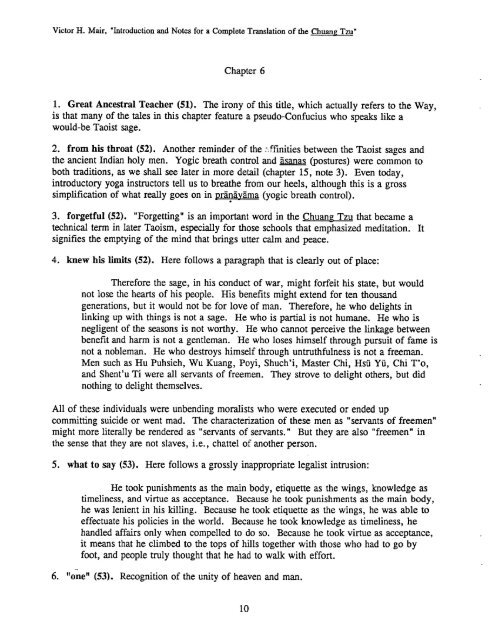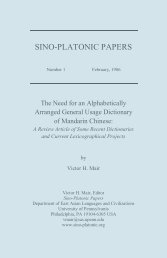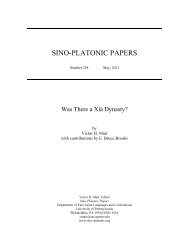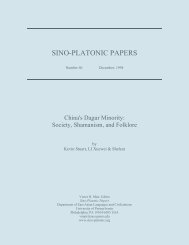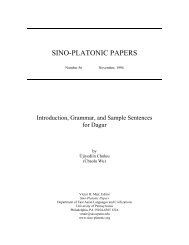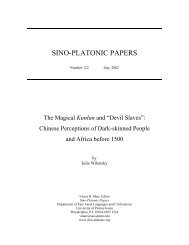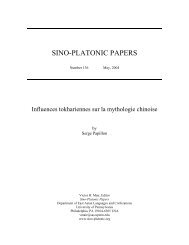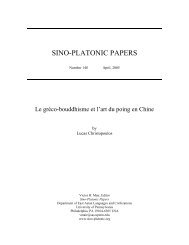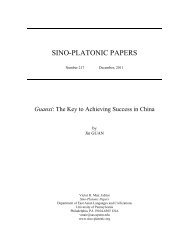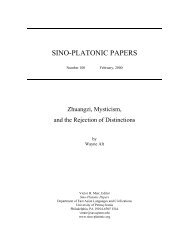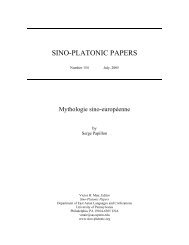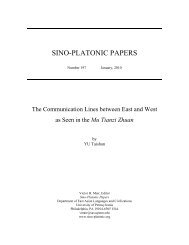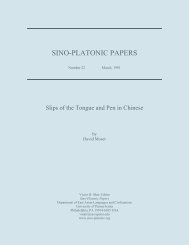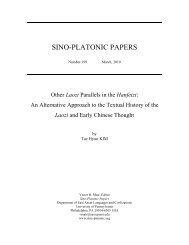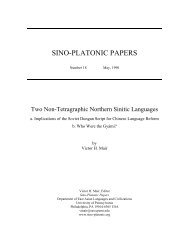Introduction and Notes for a Complete Translation of the Chuang Tzu
Introduction and Notes for a Complete Translation of the Chuang Tzu
Introduction and Notes for a Complete Translation of the Chuang Tzu
Create successful ePaper yourself
Turn your PDF publications into a flip-book with our unique Google optimized e-Paper software.
Victor H. Mair, "<strong>Introduction</strong> <strong>and</strong> <strong>Notes</strong> <strong>for</strong> a <strong>Complete</strong> <strong>Translation</strong> <strong>of</strong> <strong>the</strong> Chuan~ <strong>Tzu</strong>"<br />
Chapter 6<br />
1. Great Ancestral Teacher (51). The irony <strong>of</strong> this title, which actually refers to <strong>the</strong> Way,<br />
is that many <strong>of</strong> <strong>the</strong> tales in this chapter feature a pseudo-Confucius who speaks like a<br />
would-be Taoist sage.<br />
2. from his throat (52). Ano<strong>the</strong>r reminder <strong>of</strong> <strong>the</strong> :.ffinities between <strong>the</strong> Taoist sages <strong>and</strong><br />
<strong>the</strong> ancient Indian holy men. Yogic breath control <strong>and</strong> 2sanas (postures) were common to<br />
both traditions, as we shall see later in more detail (chapter 15, note 3). Even today,<br />
introductory yoga instructors tell us to brea<strong>the</strong> from our heels, although this is a gross<br />
simplification <strong>of</strong> what really goes on in m a (yogic breath control).<br />
3. <strong>for</strong>getful (52). "Forgettingt' is an important word in <strong>the</strong> Chuan~ <strong>Tzu</strong> that became a<br />
technical term in later Taoism, especially <strong>for</strong> those schools that emphasized meditation. It<br />
signifies <strong>the</strong> emptying <strong>of</strong> <strong>the</strong> mind that brings utter calm <strong>and</strong> peace.<br />
4. knew his limits (52). Here follows a paragraph that is clearly out <strong>of</strong> place:<br />
There<strong>for</strong>e <strong>the</strong> sage, in his conduct <strong>of</strong> war, might <strong>for</strong>feit his state, but would<br />
not lose <strong>the</strong> hearts <strong>of</strong> his people. His benefits might extend <strong>for</strong> ten thous<strong>and</strong><br />
generations, but it would not be <strong>for</strong> love <strong>of</strong> man. There<strong>for</strong>e, he who delights in<br />
linking up with things is not a sage. He who is partial is not humane. He who is<br />
negligent <strong>of</strong> <strong>the</strong> seasons is not worthy. He who cannot perceive <strong>the</strong> linkage between<br />
benefit <strong>and</strong> harm is not a gentleman. He who loses himself through pursuit <strong>of</strong> fame is<br />
not a nobleman. He who destroys himself through untruthfulness is not a freeman.<br />
Men such as Hu Puhsieh, Wu Kuang, Poyi, Shuch'i, Master Chi, Hsii Yii, Chi T'o,<br />
<strong>and</strong> Shent'u Ti were all servants <strong>of</strong> freemen. They strove to delight o<strong>the</strong>rs, but did<br />
nothing to delight <strong>the</strong>mselves.<br />
All <strong>of</strong> <strong>the</strong>se individuals were unbending moralists who were executed or ended up<br />
committing suicide or went mad. The characterization <strong>of</strong> <strong>the</strong>se men as "servants <strong>of</strong> freemen"<br />
might more literally be rendered as "servants <strong>of</strong> servants." But <strong>the</strong>y are also "freemenw in<br />
<strong>the</strong> sense that <strong>the</strong>y are not slaves, i.e., chattel <strong>of</strong> ano<strong>the</strong>r person.<br />
5. what to say (53). Here follows a grossly inappropriate legalist intrusion:<br />
He took punishments as <strong>the</strong> main body, etiquette as <strong>the</strong> wings, knowledge as<br />
timeliness, <strong>and</strong> virtue as acceptance. Because he took punishments as <strong>the</strong> main body,<br />
he was lenient in his killing. Because he took etiquette as <strong>the</strong> wings, he was able to<br />
effectuate his policies in <strong>the</strong> world. Because he took knowledge as timeliness, he<br />
h<strong>and</strong>led affairs only when compelled to do so. Because he took virtue as acceptance,<br />
it means that he climbed to <strong>the</strong> tops <strong>of</strong> hills toge<strong>the</strong>r with those who had to go by<br />
foot, <strong>and</strong> people truly thought that he had to walk with ef<strong>for</strong>t.<br />
6. "onen (53). Recognition <strong>of</strong> <strong>the</strong> unity <strong>of</strong> heaven <strong>and</strong> man.


